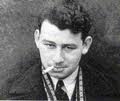 Arthur C. Clarke has always been something of an enigma to me. You can’t pidgin hole his writing the way you can most of his contemporaries. Alfred Bester wrote about the struggle between emotion and logic. William Tenn incorporated sarcastic humor as a means to comment on social issues. Frederik Pohl and Poul Andersen both laced their prose with political, and social commentary. The list goes on and on. Clarke just wrote entertaining novels. Sure, he used the mysterious, omnipotent alien entity in the 2001 series and in Childhood’s End. However, he didn’t seem to be sending a “message” to his readers. It was used as a tool to develop the plot, and that is what I really love about Clarke. He weaves a story simply to entertain his reader.
Arthur C. Clarke has always been something of an enigma to me. You can’t pidgin hole his writing the way you can most of his contemporaries. Alfred Bester wrote about the struggle between emotion and logic. William Tenn incorporated sarcastic humor as a means to comment on social issues. Frederik Pohl and Poul Andersen both laced their prose with political, and social commentary. The list goes on and on. Clarke just wrote entertaining novels. Sure, he used the mysterious, omnipotent alien entity in the 2001 series and in Childhood’s End. However, he didn’t seem to be sending a “message” to his readers. It was used as a tool to develop the plot, and that is what I really love about Clarke. He weaves a story simply to entertain his reader.
Clarke was a scientist and inventor. He had a firm grasp of technology. Therefore, you would think he would BS with the best about how a light speed engine might work. He didn’t do that. If the story called for a craft with star drive, he simply said it had a star drive and left it to the readers imagination. I noticed this in Childhood’s End, not the first time I read it; it was years later. I would have sworn he described how the engine warped space and allowed the ship to move at tremendous speeds. Not at all, he just wrote so well that I subconsciously added the details without realizing it. However, probable technology was a different matter. We are all familiar with HAL, most famous computer in history. Clarke knew we were on the edge of a major breakthrough in digital electronics and extrapolated on what was possible. HAL is the most realistic representation of artificial intelligence up to that time, and perhaps an early warning of the singularity.
Plot and character are central to all writing. Arthur Clarke was a master at both. Where some writers tend to develop plot in fits and starts, he was smooth at building to the climax, which creates a page turner. His protagonist are not always likeable; they are usually interesting, and the bad guys are never truly evil, just misguided and often empathetic.
The only fault I ever found with Clarke is not explaining the controlling entity in 2001 or Childhood’s End. I wouldn’t really call it a fault, maybe a minor irritant. We never really know the who, what, when and where and that has bothered me for decades. Maybe that was his little joke on us. I don’t know.
If I had to pick one word to describe Arthur Clarke it would be ambiguous. I have already described his abstract writing and will end this with a note on his private ambiguity. He was once asked if he was gay. He responded, “No, mildly cheerful”.








